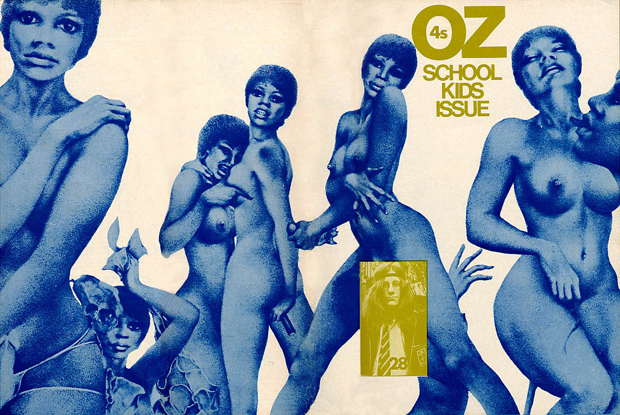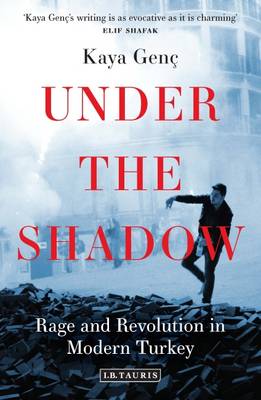5 Sep 2016 | Australia, Magazine, mobile

The school kids issue of Oz magazine lead to one of the longest conspiracy trials in England (Image: OZ/Wikimedia Commons)
Richard Neville, who co-founded the 1960s counterculture magazine Oz, has died in Australia aged 74.
The satirical magazine, which was first published on April Fool’s Day in 1963, poked fun at socially-conservative Austrailia and tackled taboo subjects such as abortion, homosexuality, sexism and racism.
The editors of the London edition – Neville, along with Jim Anderson and Felix Dennis – were prosecuted under the Obscene Publications Act in 1971 for a schoolkids issue (edited by teenage schoolchildren). Particular offence was caused by a cartoon of Rupert Bear having sex – in a collage created by schoolboy contributor Vivien Berger. The editors were found guilty and the convictions provoked an outcry. Hundreds demonstrated outside the Old Bailey in London, including John Lennon and Yoko Ono. The verdict was later quashed on appeal.
The last Oz was published in 1973.
In 2008, the English barrister John Mortimer spoke to Index about defending the editors of Oz magazine and taking on one of the most infamous obscenity cases on the 1970s.
Index: What were the grounds for prosecution?
John Mortimer: Well, it was sort of the birth of that particular Obscene Publications Act [1959], which was Roy Jenkins’s doing [Jenkins was principal sponsor of the bill as a backbench MP]. It was meant to be liberalising, because it allowed defences of literary merit and scientific merit and all sorts of ‘bits’ of merit. It was a test of that and the Obscene Publications Act, which was meant to be a work of great liberality. It would test obscenity, which was something that would tend to deprave and corrupt the people who were likely to read it. But then there were numerous defences – that it was of literary merit or historical merit or scientific merit and so on. It seemed rather strange you could be depraved and corrupted, and on the other hand you knew more about history – that could be a defence. So it never ever seemed to me to be a particularly sensible piece of legislation.
Index: What did you think of it first of all, when you discovered what the charges were?
John Mortimer: It was the schoolkids Oz and nobody wanted to do it. Everybody turned it down. They thought it was disgraceful, defending the schoolkids Oz like that. Numerous QCs turned it down.
Read the article in full here.
5 Sep 2016 | Bahrain, Campaigns, Campaigns -- Featured, Middle East and North Africa, mobile, Statements

Nabeel Rajab during a protest in London in September (Photo: Milana Knezevic)
On Monday, 5 September a Bahraini court delayed the trial of Index award-winning human rights campaigner Nabeel Rajab for a third time. The new trial date is now 6 October 2016.
“Once again, Bahrain’s repression of freedom of expression is on display for all the world to see. Nabeel has committed no crimes. He is held for expressing opinions that people around the world take for granted. We ask Bahrain to end its judicial harassment of Nabeel and renew our call for UK Prime Minister Theresa May to urge Nabeel’s release,” Jodie Ginsberg, CEO, Index on Censorship said.
Rajab faces up to 10 years in prison if convicted of spreading “false or malicious news, statements, or rumours” under article 133 of Bahrain’s penal code; a further two years imprisonment if convicted under article 215 of the penal code for “offending a foreign country [Saudi Arabia]” for tweets related to the Saudi-led war in Yemen and an additional three-year sentence if convicted of “offending a statutory body” under article 216 of the penal code for comments criticising conditions in Bahrain’s Jau prison.
In addition to these charges, he may also face a trial on charges of “spreading false news” for similar statements made during televised interviews last year. That case has not yet been referred to court, but is believed to have served, among others, for his arrest on 13 June.
Arrested on 13 June 2016 at his home, Rajab was held in filthy conditions and solitary confinement that have exacerbated heart and other health issues. Originally scheduled to appear in court on 12 July, the case was moved to 2 August when it was rescheduled for 5 September.
Recent coverage of Nabeel Rajab’s case
Bahrain: Protesters celebrate Nabeel Rajab’s birthday and call for his release
Index award winners and judges call for release of Bahraini campaigner
Groups urge Bahrain to release prominent human rights defender
Who is Nabeel Rajab?
5 Sep 2016 | Europe and Central Asia, Events, Turkey

What can be made of recent events in Turkey where a coup attempt was stopped by people on the streets? Asia House is pleased to welcome acclaimed writer Kaya Genç, who currently lives in Istanbul and has been covering his country for the past decade. Genç will talk to Rachael Jolley, editor of Index on Censorship magazine, about his forthcoming book Under the Shadow: Rage and Revolution in Modern Turkey.
As research for the book and for his other writing, Genç has met activists from both sides of Turkey’s political divide: supporters of Erdoğan’s conservative vision and Gezi Park protestors who fought against Istanbul’s gentrification. He has spoken with artists, writers, politicians, professionals, business leaders and many more. Through his observations and interviews, he will take you into a country deeply divided along historical, social and geographical lines.
There will be a book signing following this talk, where you will be able to purchase advance copies of the book at a discount price.
Kaya Genç is a novelist and essayist from Istanbul whose writing has appeared in The Guardian, The Paris Review and Time Magazine, among others. His first novel, L Avventura was published in 2008. Genç has a PhD in English literature and is the Istanbul correspondent of The Believer and The LA Review of Books, as well as a contributing editor at Index on Censorship. He is currently writing a history of Turkish literature for Harvard University Press. Under the Shadow will be published by IB Tauris on 6 October 2016.
When: 12 September, 6.45-8pm
Where: Asia House, 63 New Cavendish St, London, W1G 7LP
Tickets: Available via the Asia House website. Use the promo the code “Index” at checkout for £2 discount.
5 Sep 2016 | Events, United Kingdom
Index on Censorship and Demos will hold a panel discussion at Conservative Party Conference to explore the implications of the UK government’s Counter-Extremism and Safeguarding Bill.
Striking the right balance between strengthening national security measures and safeguarding civil liberties is a challenge faced by any attempt to counter terrorism. As the government guards against the spread of extremist ideologies, it will need to ensure new powers for law enforcement do not impinge upon citizens’ civil liberties or have the unintended effect of further alienating those young people vulnerable to radicalisation. This fringe event will explore the legal and democratic implications of the bill, as well as the practicalities surrounding enforcement.
Date & Time
Tuesday 4th October, 1230 – 1400
Speakers
Sarah Newton MP, Parliamentary Under Secretary of State at the Home Office (invited)
Dominic Grieve MP, Chair of the Intelligence and Security Committee (invited)
Rachael Jolley, Index on Censorship
Rick Muir, The Police Foundation
Louis Reynolds, Demos
Chair: Kate McCann, The Telegraph (invited)
Venue
Room 107, Jurys Inn, Birmingham (map)
Tickets: Free. No registration required for this fringe event.



